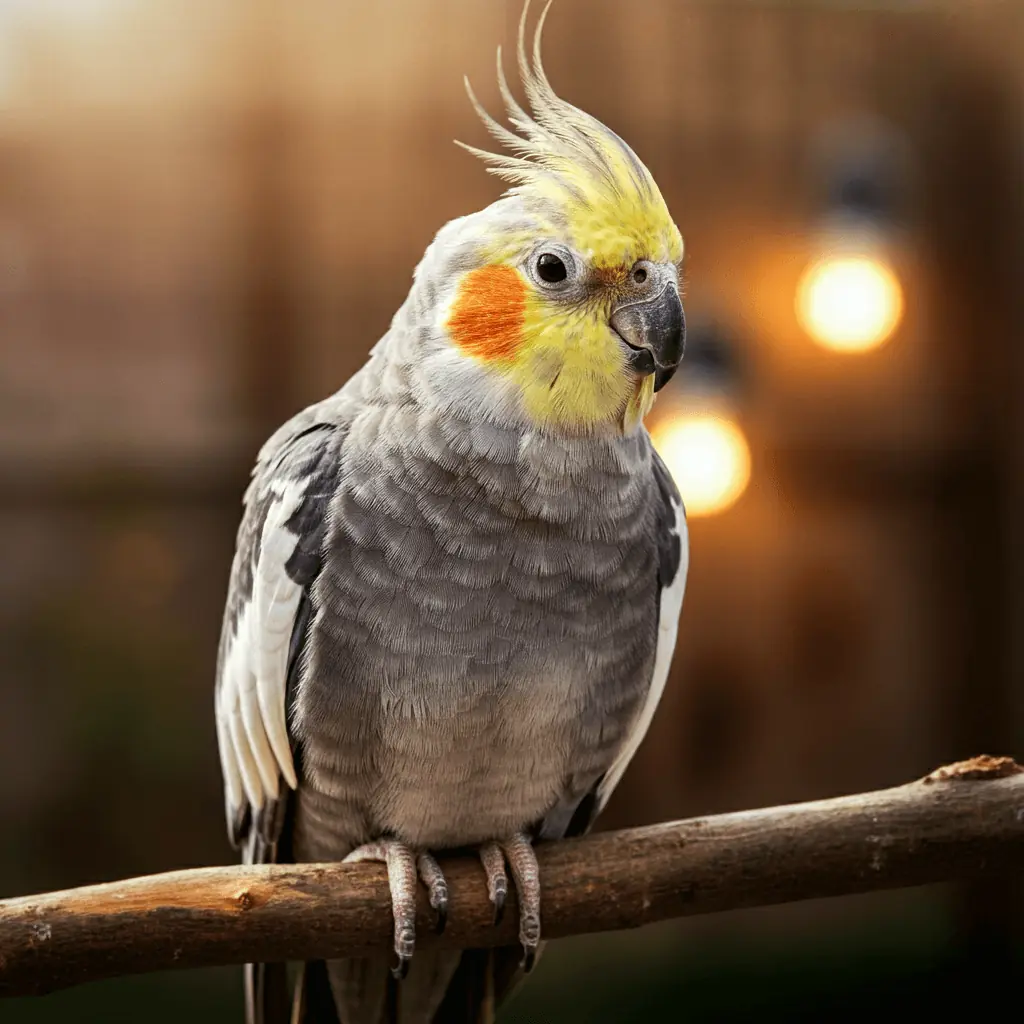What is Cockatiel Feather Plucking?
Cockatiel feather plucking, also known as feather picking, is a common behavioral issue where a bird pulls out its own feathers. This can range from mild plucking to severe feather loss, and in extreme cases, it can lead to self-mutilation. Feather plucking can be a sign that something is wrong, whether it’s due to stress, boredom, or even an underlying medical condition.
Feather plucking in cockatiels is not just a cosmetic problem—it’s often a sign that your bird is experiencing discomfort or distress. Cockatiels are sensitive birds, and when they’re anxious or lacking mental stimulation, they may start pulling out their feathers as a coping mechanism. You may also notice other signs of stress in your cockatiel, such as constant pacing or vocalizations, which often accompany feather plucking.
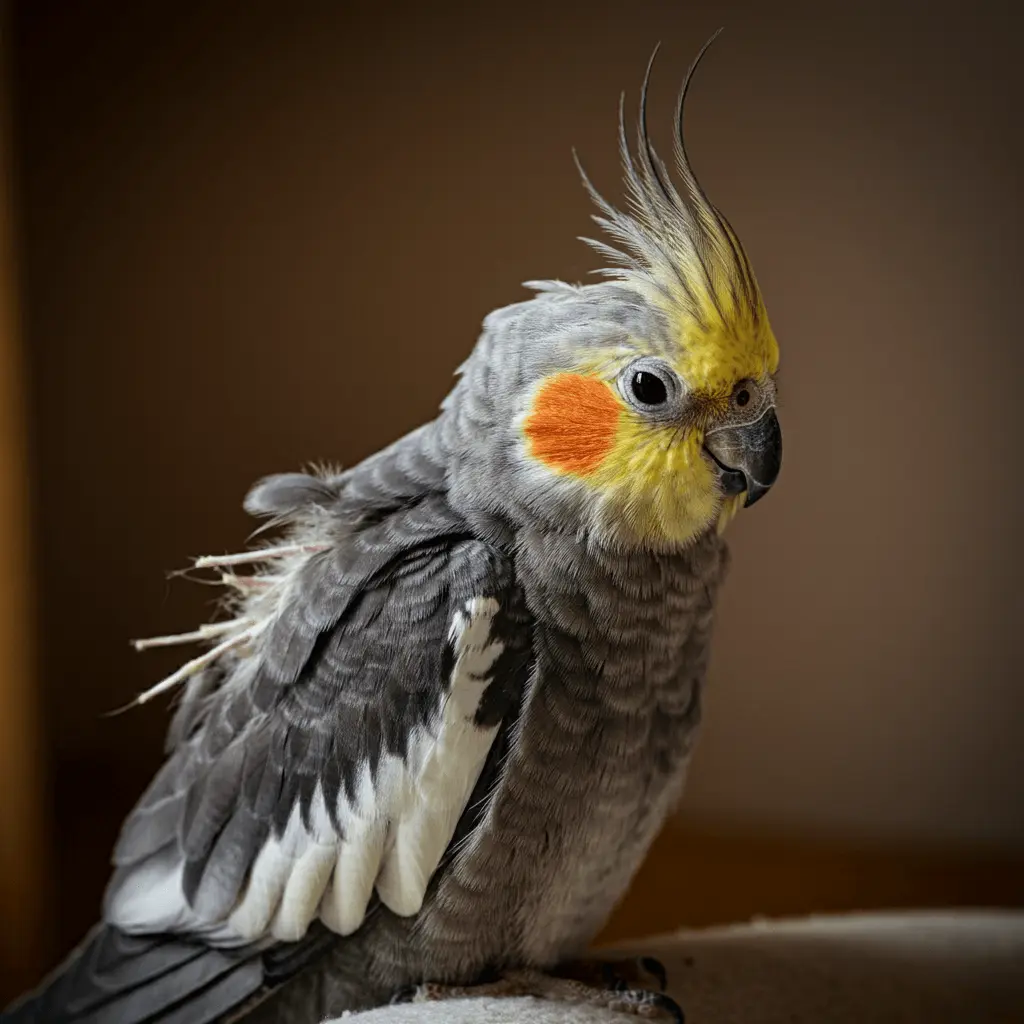
This cockatiel is experiencing feather plucking, a common sign of stress or anxiety in birds.
Understanding the root cause of cockatiel feather plucking is essential to stopping it. It could be due to environmental factors like a lack of enrichment in their cage, nutritional deficiencies, or even health problems such as skin irritation or parasites. If you notice your cockatiel plucking its feathers, it’s important to act quickly to figure out the cause and prevent further damage.
Feather plucking isn’t normal and can lead to serious health issues if left unchecked. In most cases, it’s a sign that your cockatiel is not in an ideal state of well-being. By understanding why your bird might be plucking its feathers, you can take the necessary steps to address the problem and help your feathered friend live a happy, healthy life.
Common Causes of Cockatiel Feather Plucking
Cockatiel feather plucking can stem from a variety of reasons, and pinpointing the exact cause is key to stopping the behavior. While some issues may be related to your cockatiel’s environment, others could be tied to its physical or emotional health. Here are the most common causes of feather plucking in cockatiels:
1. Stress and Anxiety
Cockatiels are highly sensitive birds, and any form of stress can lead to feather plucking. Changes in their environment—such as a new cage setup, loud noises, or even the absence of a familiar person—can trigger anxiety. When stressed, a cockatiel might start pulling out feathers as a coping mechanism. Reducing stress is one of the first steps in stopping feather plucking.
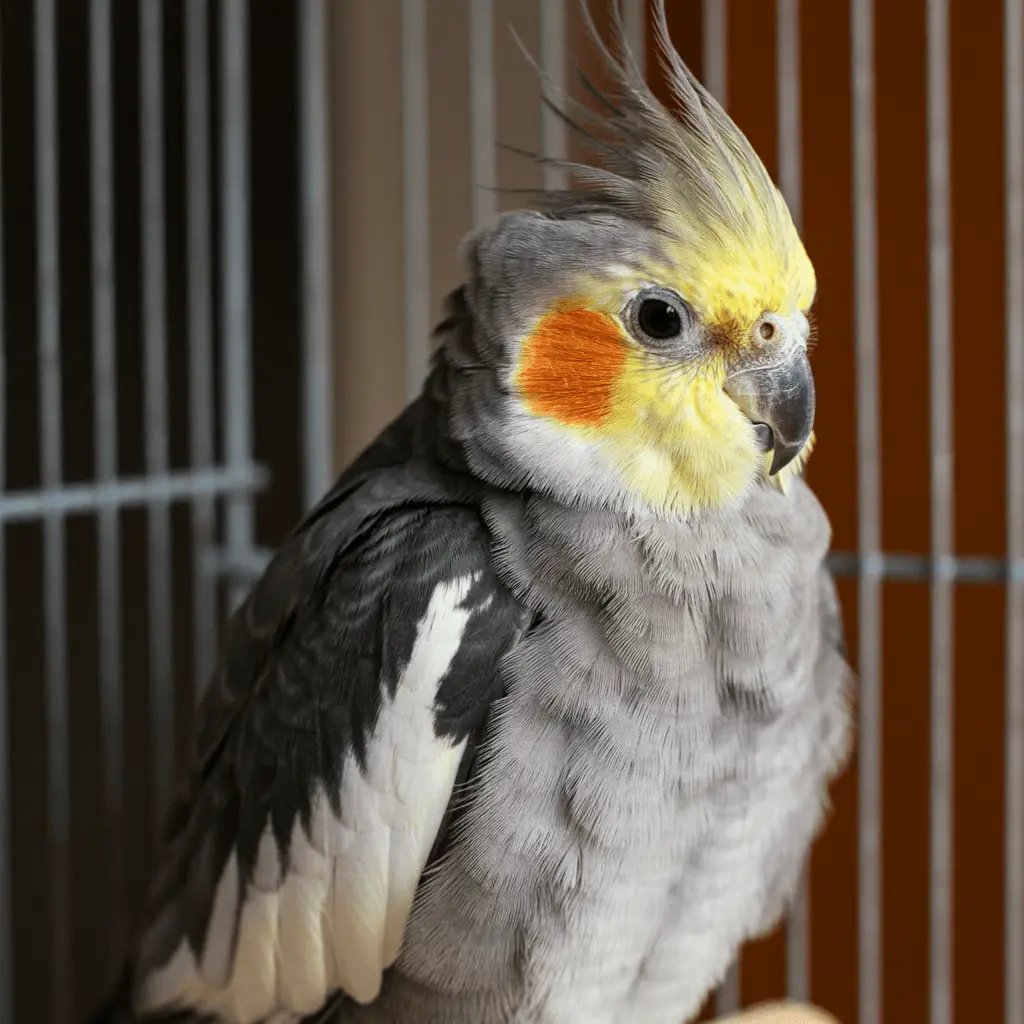
A stressed cockatiel with puffed feathers, often signaling anxiety or environmental discomfort.
2. Boredom and Lack of Mental Stimulation
A bored cockatiel is a feather-plucking cockatiel. These intelligent birds need regular mental and physical stimulation to stay happy. Without toys, interaction, or opportunities to explore, your cockatiel may resort to feather picking as a way to occupy itself. Ensuring your bird has a variety of toys and social interaction can help prevent this behavior.
3. Nutritional Deficiencies
Diet plays a significant role in your cockatiel’s overall health. A lack of essential nutrients like vitamins and minerals can lead to skin irritation or feather abnormalities, which may cause your bird to pluck its feathers. A balanced diet rich in seeds, pellets, fruits, and vegetables is crucial to maintaining healthy feathers.
4. Allergies or Skin Irritation
Sometimes, feather plucking in cockatiels is a response to physical discomfort. Allergies to certain foods, bedding, or even dust in the environment can irritate their skin, prompting them to pull out feathers. It’s important to observe if the plucking coincides with any recent changes in their diet or surroundings.
5. Hormonal Imbalances
Hormonal changes, particularly during breeding season, can also lead to feather plucking. If your cockatiel is experiencing hormonal surges, they might become frustrated and resort to plucking. While this is a natural phase, providing a calm and stable environment during these periods can help minimize feather loss.
6. Parasites and Medical Issues
Feather plucking can sometimes be a sign of an underlying medical condition. External parasites like mites, or even internal health issues, can cause discomfort, leading your cockatiel to pluck its feathers. If you suspect a medical issue, it’s crucial to consult a veterinarian for a thorough checkup.
How to Stop Cockatiel Feather Plucking
Stopping cockatiel feather plucking requires understanding the underlying cause and making the necessary adjustments to improve your bird’s overall well-being. Here are practical steps you can take to help stop your cockatiel from plucking its feathers:
1. Reduce Stress and Anxiety
One of the most common causes of cockatiel feather plucking is stress. To reduce anxiety, try to identify and eliminate any sources of stress in your cockatiel’s environment. This could mean moving the cage to a quieter location, maintaining a consistent routine, or introducing calming aids like soft music. Cockatiels thrive in a peaceful, stable environment, so minimizing disruptions can make a big difference.
2. Provide Mental Stimulation and Enrichment
Boredom is another major factor in feather plucking. Cockatiels are intelligent birds that need mental and physical stimulation to stay content. Offer a variety of toys, puzzles, and opportunities for play outside the cage to keep your bird engaged. You can rotate toys regularly to keep things fresh and exciting for your cockatiel. Social interaction, whether with you or another bird, also helps alleviate boredom.
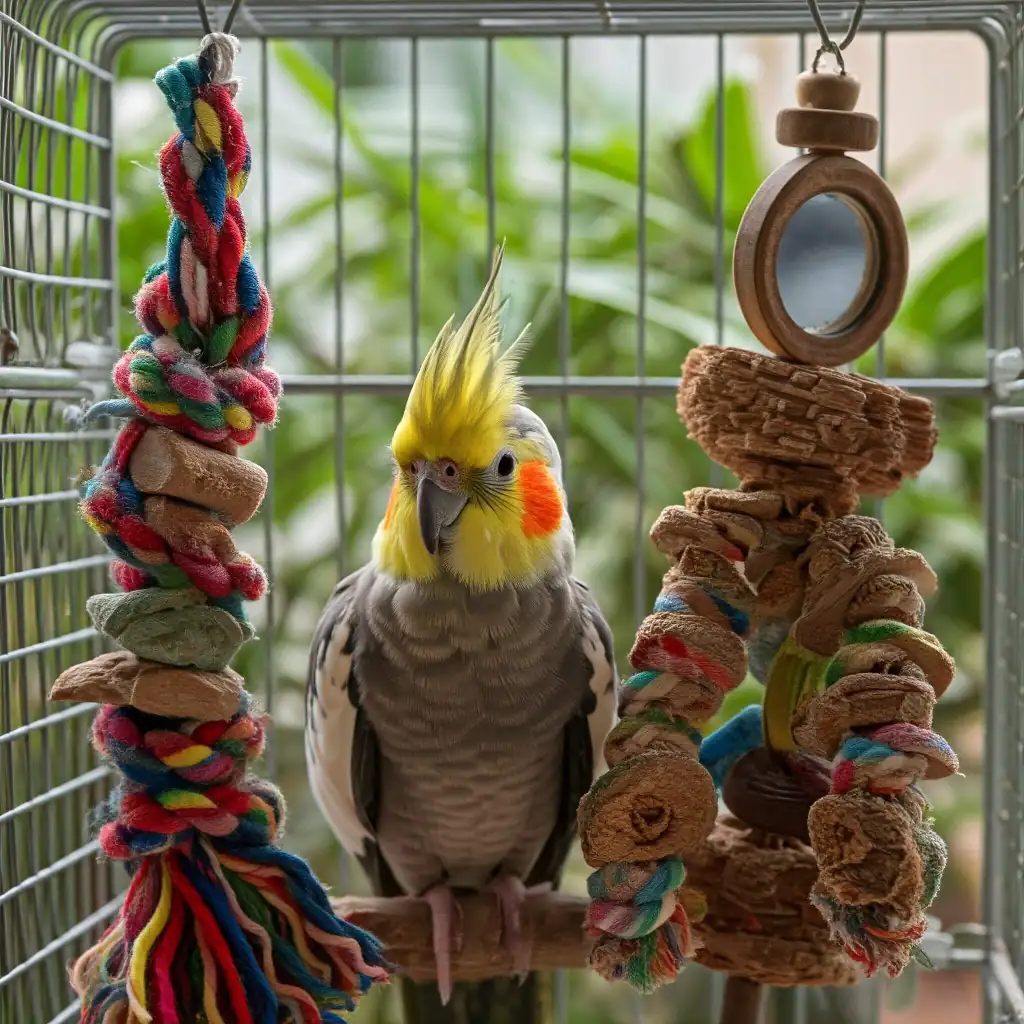
Engaging toys and an enriched cage environment help prevent feather plucking in cockatiels.
3. Ensure a Balanced Diet
Poor nutrition can lead to skin irritation and poor feather quality, which in turn causes feather plucking. Make sure your cockatiel’s diet is rich in vitamins and minerals by offering a balanced mix of pellets, fresh fruits, vegetables, and seeds. A healthy, well-nourished bird is less likely to experience discomfort that leads to feather plucking.
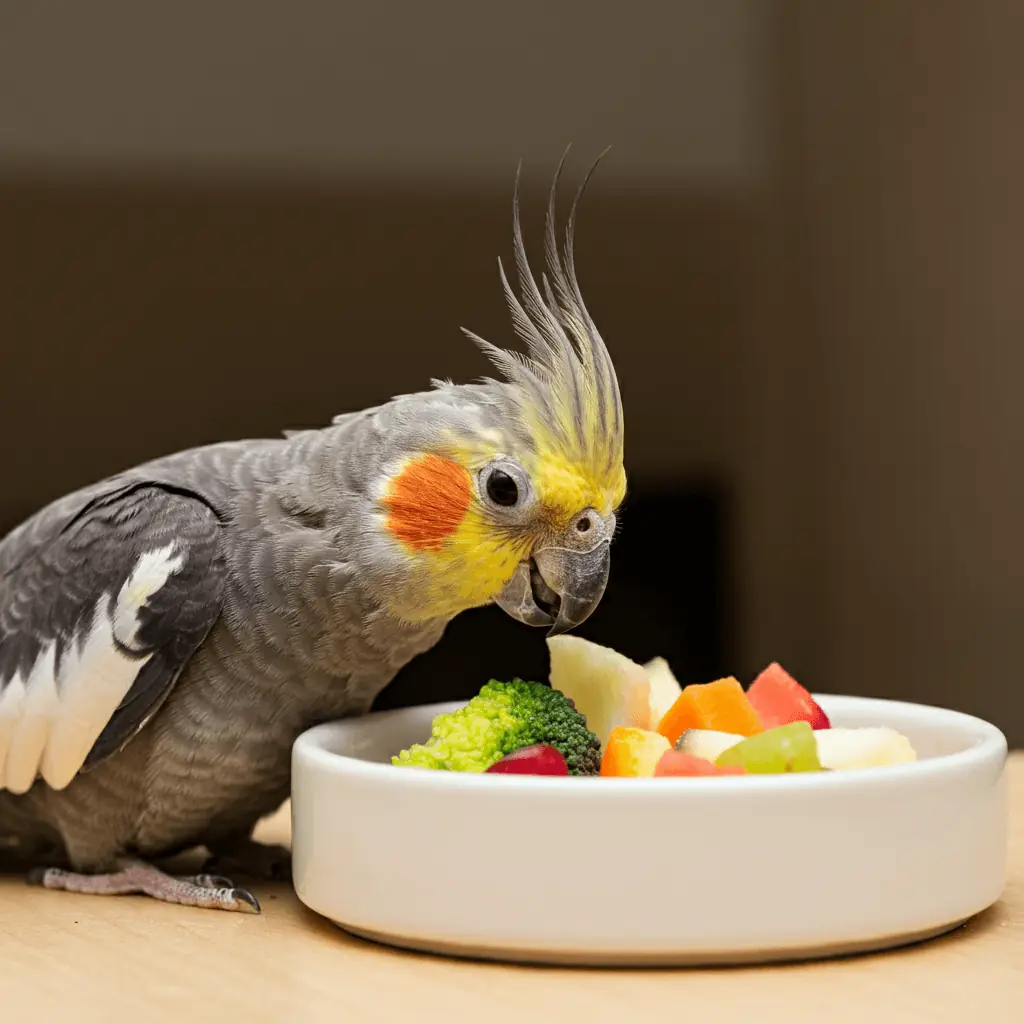
A balanced diet, including fresh fruits and vegetables, is essential for preventing feather plucking in cockatiels.
4. Address Any Allergies or Skin Irritations
Sometimes feather plucking is a response to itchy skin caused by allergies or environmental irritants. Check for potential allergens in your bird’s environment, such as certain types of bedding, air fresheners, or even new foods. If you suspect your cockatiel has skin allergies, consider switching to hypoallergenic bedding and consulting a vet to determine the root cause of irritation.
5. Consult a Vet for Medical or Hormonal Issues
If feather plucking persists despite efforts to reduce stress and improve the environment, it’s important to consult a veterinarian. There may be an underlying medical issue such as parasites, infections, or hormonal imbalances causing your cockatiel discomfort. A vet can help identify these problems and provide treatments that will address the root cause of the feather plucking.
By implementing these steps, you can help stop cockatiel feather plucking and improve your bird’s quality of life. Remember, it often takes time and patience to see results, but with the right care, your cockatiel can recover from feather plucking and return to a healthy, happy state.
Preventing Feather Plucking in the Future
Once you’ve addressed your cockatiel’s feather plucking, it’s essential to take steps to prevent it from happening again in the future. Prevention is all about maintaining a healthy, stimulating environment and keeping your bird’s stress levels low. Here are some simple but effective ways to prevent feather plucking in the long run:
1. Regular Checkups and Health Monitoring
Routine vet visits are crucial for catching potential health issues early. Parasites, infections, or even nutritional deficiencies can contribute to feather plucking. By ensuring your cockatiel gets regular checkups, you can address any medical problems before they escalate. A healthy bird is much less likely to engage in feather plucking.
2. Proper Cage Setup and Environment
Your cockatiel’s living environment plays a big role in its mental and physical well-being. Make sure your bird’s cage is large enough to allow for flight and movement, and include a variety of perches, toys, and accessories to keep them mentally stimulated. Position the cage in a calm, quiet part of your home, away from loud noises and potential stressors. A well-organized, enriched environment reduces the likelihood of boredom and stress, two major triggers for feather plucking.
3. Social Interaction and Bonding
Cockatiels are social birds that thrive on interaction with their human companions and, if possible, other birds. Make sure to spend time bonding with your cockatiel every day. Whether it’s through talking, petting, or letting them out of the cage to explore, regular interaction keeps your bird happy and mentally stimulated. A well-socialized cockatiel is less likely to develop behavioral issues like feather plucking.
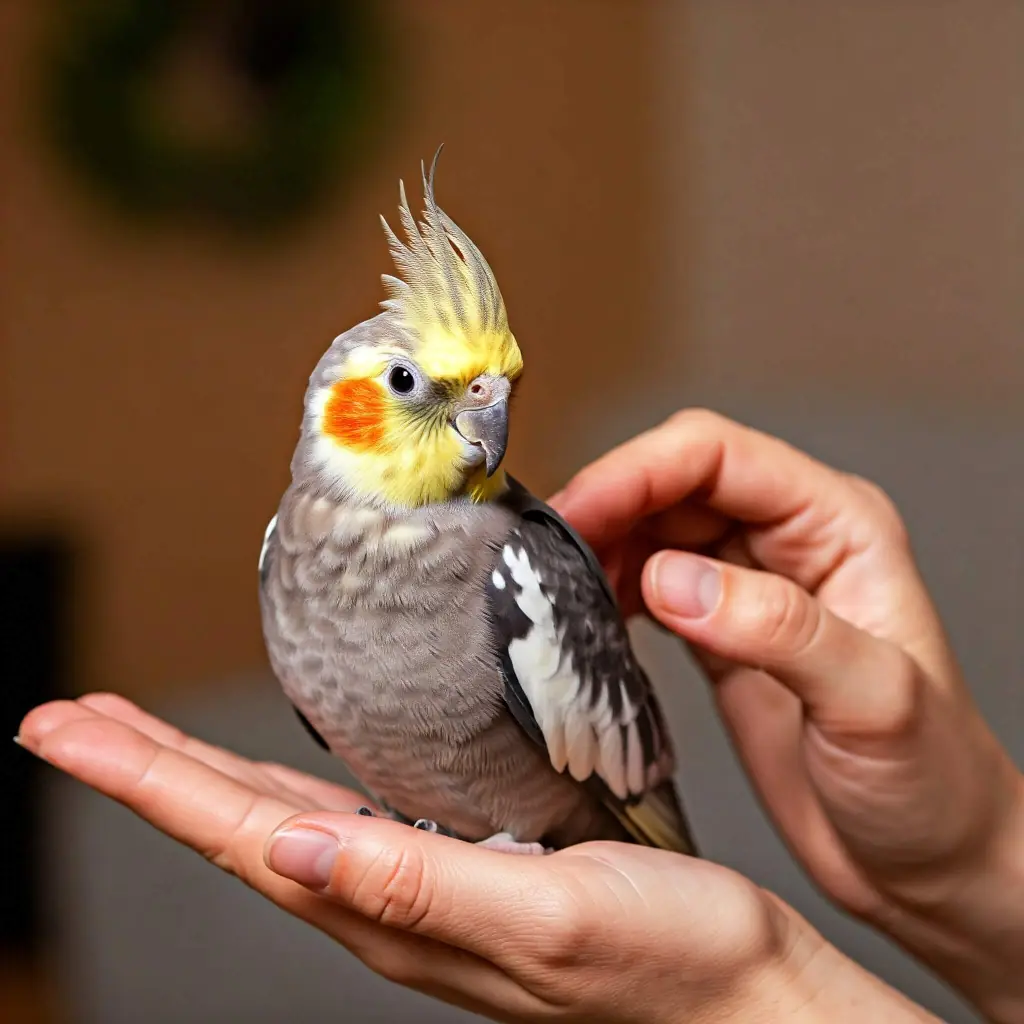
Strengthening the bond between you and your cockatiel through gentle interaction helps reduce stress and prevent feather plucking.
4. Provide Mental Stimulation
Feather plucking often starts when a bird is bored or under-stimulated. To prevent this, rotate toys regularly, introduce puzzle feeders, and offer activities that encourage your cockatiel to think and explore. Even simple changes like adding foraging opportunities can make a big difference in keeping your bird engaged and content.
5. Maintain a Balanced Diet
Proper nutrition is essential to your cockatiel’s health and feather condition. Continue to offer a balanced diet rich in seeds, pellets, fresh fruits, and vegetables. Nutritional deficiencies can lead to poor feather quality and skin irritation, which may trigger plucking. By ensuring your cockatiel has a healthy, varied diet, you reduce the chances of future feather plucking.
Preventing feather plucking is all about creating a healthy, stress-free environment for your cockatiel. With proper care, regular vet checkups, and plenty of mental stimulation, you can keep your bird happy and prevent this problematic behavior from returning.
Frequently Asked Questions (FAQs)
When dealing with cockatiel feather plucking, it’s natural to have many questions. Here are some of the most commonly asked questions, along with straightforward answers to help you better understand this behavior and how to manage it.
Is feather plucking normal in cockatiels?
No, feather plucking is not normal behavior in cockatiels. It’s usually a sign of stress, boredom, or an underlying health issue. If your cockatiel is plucking its feathers, it’s important to identify the cause and address it promptly to prevent further damage to your bird’s health.
Can a vet help stop feather plucking?
Yes, a veterinarian can be very helpful in stopping feather plucking. If the behavior is caused by a medical issue such as parasites, skin irritation, or nutritional deficiencies, a vet can provide treatment and guidance. They can also rule out serious health conditions and offer advice on managing behavioral causes like stress or anxiety.
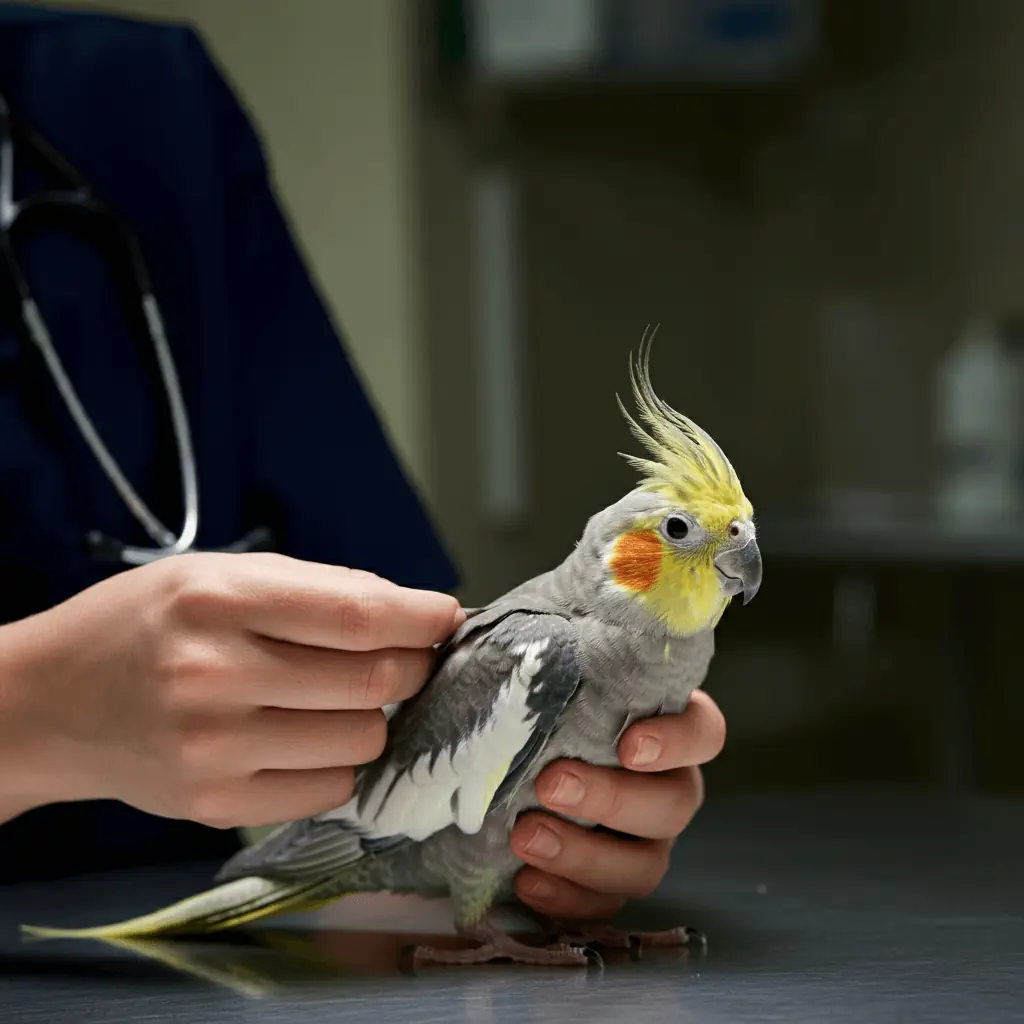
A veterinarian checkup is essential to rule out medical causes of feather plucking in cockatiels.
How long does it take to stop feather plucking?
The time it takes to stop feather plucking can vary depending on the cause. If the issue is environmental, such as boredom or stress, you may see improvement within a few weeks once changes are made. However, if the plucking is due to a medical or deep-seated behavioral issue, it may take longer and require ongoing attention.
Will feathers grow back after plucking?
In most cases, feathers will grow back after plucking, but it depends on the severity and duration of the behavior. If the feather follicles are not permanently damaged, your cockatiel’s feathers should regrow once the plucking stops. However, if the behavior has been going on for a long time and has caused significant damage, regrowth may be limited.
How can I tell if my cockatiel’s feather plucking is due to a medical issue?
If your cockatiel’s feather plucking is accompanied by other symptoms such as changes in appetite, lethargy, or visible skin issues like redness or irritation, it may be due to a medical problem. In this case, it’s best to consult a vet for a thorough examination and diagnosis.

